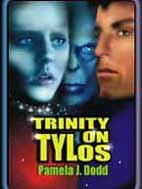Universal Themes in Trinity on Tylos
In my last post, I mentioned some themes, typically found in science fiction, which are in Trinity on Tylos. Good stories, regardless of genre, will have themes that appeal to many people. Spoiler alert— again, there might be some details in this post which you wouldn’t want to know if you have yet to read Trinity on Tylos.
Motherhood is the most important job in the world— Some in our society frown on the sacrifices that women have often made for their offspring, thinking that these keep the women from reaching their full potential. Yet, thank goodness, quite a few young women continue to bear children and devote themselves to rearing them. Venice becomes a mother in an unusual manner, one that makes some readers cringe. (Good– if the book didn’t challenge the reader’s thinking just a bit, then it would be boring.) Never-the-less, once she joins the mom club, she doesn’t shirk her duty, and that is one definition of character.
Duty trumps personal desire— That theme isn’t popular in our culture at the moment, but it has been part and parcel of heroism through out history and will be again. If man is to succeed in the future, he will have to reverse this trend toward egocentric selfish behavior. Both Venice and Alathea make decisions which might seem unrealistic for today’s audience, especially sacrificing their personal safety for that of their shipmates, and that is one reason I set this story in the future.
Human beings can be both fallible and honorable— Superheroes were invented within the past hundred years, and popular fiction and film have embraced the idea that to be heroic is to be invulnerable. Yet, history is filled with examples of people who were far from perfect, yet were held in great esteem. From Moses, who became the spokesperson for the Israelites, despite being tongue-tied and inarticulate, to Patton who was a great general, despite a gruff personality, many great men who wouldn’t fit too well into Superman’s tights have been heroes. In Trinity, Captain McPherson believes he is doing the right thing, even when Venice makes it plain he is not. Despite this flaw, he is an honorable man who continues to lead the crew of the Excalibur effectively. Captain Mac is human, with all the foibles associated with that label.
Love can last through many trials— We tend to throw in the towel rather quickly when it comes to relationships nowadays. Venice loses her spouse early in the story, but she never lets go in her heart. Although he is separated from his wife, Steve quietly continues being the executive officer of the Excalibur, but he doesn’t seek a new lover, for the same reason. In a serially monogamous society, readers may have trouble empathizing with their steadfast love, but real love can last long and overcome incredible odds.
A fan of The Gift Horse asked why I chose a futuristic setting for Trinity, and I did so because some of the themes might not work as well in a contemporary story. But Trinity is a relationship book and an action/adventure story at the same time. Some of my readers have said they didn’t expect to enjoy a science fiction yarn, but they did like it, and I believe that is because Trinity is much more than a space opera.
Labels: books, colonization, publishing, science fiction, space opera, themes, Trinity on Tylos, writing

